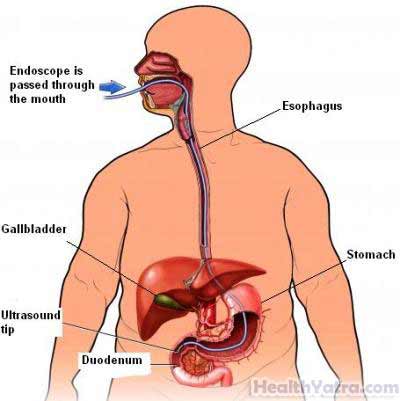Definition
Endoscopic ultrasonography (EUS) is used to view the walls of your digestive tract and other nearby organs. An ultrasound uses sound waves to make images of the inside of the body. In an EUS, the ultrasound probe is passed down the throat or up the rectum and into digestive tract.
Reasons for Test
EUS may be used to:
- Diagnose or find the cause of a pain or abnormality in the digestive tract
- Locate and view tumors or abnormalities in the pancreas, bile ducts, and chest cavity
- Understand the extent of certain cancers and whether they have spread to lymph glands or other vital organs
- Take tissue samples ( biopsy) to diagnose a condition
- Provide needle aspiration (to drain a cyst)
Possible Complications
Complications are rare, but no test is completely free of risk. If you are planning to have EUS, your doctor will review a list of possible complications, which may include:
- Infection
- Bleeding
- Mild sore throat for 1-2 days
- Reaction to sedatives
- Regurgitation of stomach contents into the lungs
- Damage to digestive tract
Factors that may increase the risk of complications include:
- Advanced age
- Having other medical conditions
Be sure to discuss these risks with your doctor before the test.
What to Expect
Prior to Test
Leading up to the test, your doctor may instruct you to:
- Avoid eating or drinking (not even water) for at least six hours before the test.
- Take a special cleansing solution, laxative, or enema. This will clean out your intestines. You may also be asked to follow a clear liquid diet.
- Arrange for a ride home after the test if you have to take a sedative.
In most cases, it is okay to take aspirin and other blood-thinning medicines before the test. Ask your doctor if you take these medicines.
Description of the Test
Your doctor may spray your throat with a local anesthetic. This will numb your throat, so you will not feel discomfort. You may also be given a sedative. This will help you to relax and reduce anxiety.
In most cases, you will lie on your left side. A thin, flexible tube, called an endoscope, will be inserted either through your throat or anus. The endoscope will have an ultrasound probe on the end of it. The ultrasound machine will create images of the digestive tract. When the imaging is done, your doctor will gently pull the endoscope out.
In some cases, the doctor might use the ultrasound to help take a biopsy or drain a cyst. If this happens, the doctor will insert tools through the endoscope to the area in question.

After Test
After the test, you will recover in a special area. Your throat may be a little sore. Slight bloating is normal from the air and water that entered the digestive tract.
When you return home, do the following to help ensure a smooth recovery:
- Rest when you get home.
- When you feel ready, resume your normal diet.
- Wait until the sedative wears off before you operate machinery, drive, or make any major decisions. You may need to wait 24 hours.
- Take medicine as directed.
How Long Will It Take?
15-45 minutes
Will It Hurt?
EUS is slightly uncomfortable.
Results
Your doctor may talk to you about the results right away. If you had a biopsy, it may take longer to receive results.
Call Your Doctor
After the test, call your doctor if any of the following occurs:
- Pain or discomfort that does not go away or worsens
- Vomiting blood, blood in stool, or dark black stool
- Indigestion
- New or unusual symptoms
In case of an emergency, call for medical help right away.
